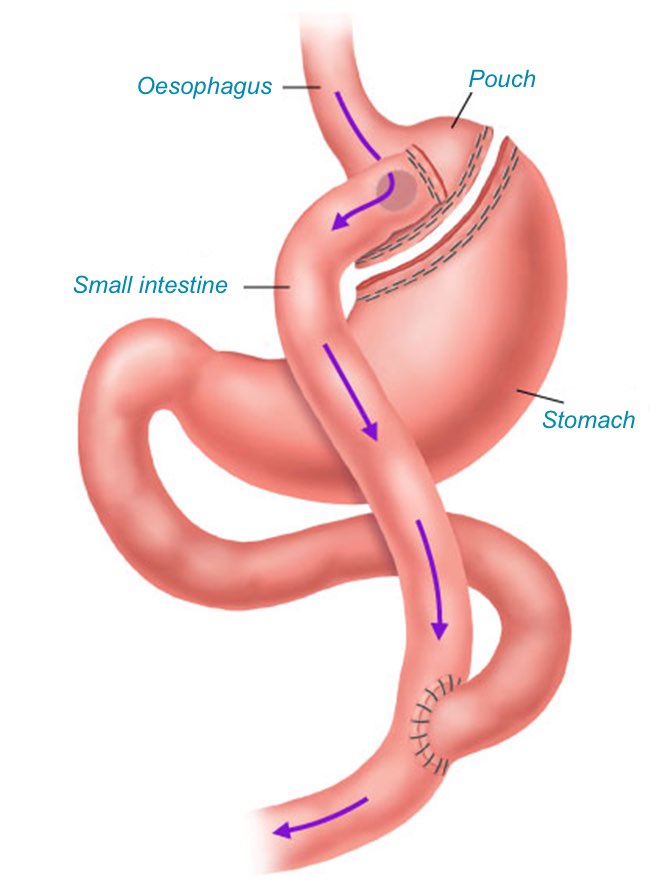Gastric Bypass
What is a gastric bypass?
A laparoscopic roux-en-y gastric bypass, commonly called a gastric bypass, consists of two components and has often been referred to as the “gold standard” of weight loss surgery, with 60 to 80% excess weight loss as a result.

The top of the stomach is first separated from the rest of the stomach, so a small 30ml pouch is created. The second component of this type of weight loss surgery, is the “bypass” component. The bottom end of the small intestine is connected to the new stomach pouch, and the top end of the small intestine is connected further down. As a result, the stomach is “bypassed”, and stomach acids and digestive enzymes are mixed with the food that you digest.
About Us
At The Surgeons Collective we work as a team of expert surgeons, as well as hepatologists, gastro-enterologists and accredited dietitians.
Gastric sleeve
What are the effects of a gastric bypass?
A gastric bypass creates weight loss results in several ways. Similar to other obesity surgery procedures, it starts with a smaller stomach after the procedure. The new “stomach pouch” that is created by your obesity surgeon, is much smaller than the original stomach. As a result, you feel full much faster and you take significantly smaller meals. You now consume less calories, and there is less digestion of food by this smaller stomach. But because a section of the intestine has now been “bypassed”, there is also less absorption of calories. The segment that is bypassed, doesn’t receive any food, and doesn’t absorb calories or nutrients.
Bypassing part of the normal pathway for digestion also changes the way your hormones work. This procedure is known to change the “gut hormones” and they control hunger feelings and feelings of saturation. The rerouting of the food stream also reverses one of the mechanisms that link obesity to type 2 diabetes.
Pros and cons of a gastric bypass
As with any type of procedure, there are a few pros and cons to consider:
Pros
- Has been performed since the 1960s as a highly popular type of weight loss surgery
- Slightly higher weight loss success rates compared to a sleeve gastrectomy or an adjustable gastric band procedure.
- Often used as the surgery of choice for patients with significant gastro-oesophageal reflux disease (GORD).
Cons
- Lifelong dependence on nutritional and vitamin supplements
- Need for regular blood tests
- Risks of nutritional deficiency, Vitamin B12, folate, anaemia
- Risk of dumping syndrome: weakness or rapid bowel evacuation after meals
- Risk of internal hernia (protrusion of tissue through the peritoneum) & bowel obstruction
- Risk of ulcers
- Not reversible
What happens after your obesity surgery?
At The Surgeons Collective we commit to supporting you before, during and after your surgery. This includes the work of our team of experienced dietitians, to give you dietary advice so you can optimise your weight loss results and your overall health after your bariatric procedure.
A typical post-operative diet for a gastric bypass procedure consists of:
- Optifast® program for 2-4 weeks preoperatively as recommended by surgeon
- Clear fluids for 1-2 days after surgery
- Week 1-2 - Full fluid diet
- Week 3-4 - Puree diet
- Week 5 – Soft diet
- Week 6 – Normal diet of 3 small meals
If you have been considering weight loss surgery and you are unsure about the most suitable procedure, please speak to our friendly receptionists. As a team of experienced surgeons, dietitians, specialist doctors and support staff, we commit to giving you the best possible care, clear communication and a comprehensive overview of all the steps that are involved in your weight loss journey. We believe that you deserve expert surgery as well as excellent care, kindness and support. So if you are planning on taking this important step, speak to our team at The Surgeons Collective in Perth and we will be happy to help you, because we never give up on your health.
More bariatric surgery topics
- Gastric bypass diet: what should I eat after surgery?
Adhering to your diet plan for gastric bypass after surgery is vital to both reducing the risk of complications after your operation and to ensure the long-term success of the procedure.
Recent articles
Contact us
THE SURGEONS COLLECTIVE
McCourt St Medical Centre
Level 1, Suite 10, 2 McCourt Street
West Leederville,
Perth 6007, WA
THE SURGEONS COLLECTIVE
Monday - Thursday | 8:30am - 4:30pm
Friday | 9:00am - 1:30pm
